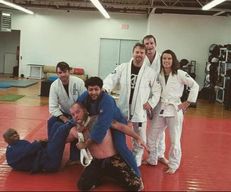 My partners when I started BJJ. My partners when I started BJJ. Huge muscles, tattoos, 220, bearded, gruff to the max. 6"4', pot belly, overly aggressive, but nonathletic. Older, out-of-shape, but with years of experience. Short, quick, technically savvy, unemployed, overly trained machine. New, white belt, spastic, moves unjustifiably and makes up for lack of technique with muscle. These are my mat partners. I'm a 5'2, 118 lb, female. On the mat I look like a lost child. A midget amongst monsters. Or a frail fish amongst sharks. People seem to think that as a female in bjj, wrestling or judo you need to be tough. You need to be able to take falls, thrive on physicality, and not flinch at bumps n bruises. But it is rarely discussed the mental fortitude and chess that has to be played every time you walk onto a mat. As a 5'2" tiny woman, I not only am trying to better myself on the mat but a large portion of my training is focused on not getting injured, which basically means learning how to read and interact with the other, often larger, sometimes misogynistic, people in the gym. My husband has to deal with the same principle of non-injury on a basic level. Knowing that he needs to control spastic white belts to ensure they don't inadvertently injure him. Understanding that certain techniques shouldn't be used with larger partners or you can put yourself in a precarious position. And knowing when he needs to change the pace as to not anger a hot-head. But my husband never has to deal with the female part. The unspoken distaste that many men have at the idea of being scored on, taken down by, passed by, or put at a "losing" position by a female. As a woman on the mat, you see it immediately. This heated look. A deep vengeance stare. A disbelief at themselves for being bettered by a female. It's in that moment that I immediately have to turn on a charm that men never have to utilize on the mat. A smile. A joke. Something to ease their frustration. Anything to ensure that their next action isn't something to deliberately cause injury to me. This is not to say that a larger partner ever intends to train with a woman differently. And many of my favorite long time partners are dudes. This is usually a phenomenon that occurs when you are new to a gym. When the males do not yet have a comfort level with you. It's something that I have to feel out anytime a new member joins a gym, a visitor is in town, or I am visiting a new place. It's an unspoken dialog that every female has with herself prior to working with a new dude - "How do I stay safe with you? Will you react like a jerk? Will you use too much strength? Will you roll using only technique? Are you someone that will be pissed if a girl does ok? Are you super chill and will aid my development while just working on your technique?". Recently a good friend and I had a great conversation about this- reveling in the fact that we have this secret super power that needs employed at practice. It's an unspoken conversation that every female has every time she goes with a new man. It's a chess game she plays with herself to ensure each round is completed with her body remaining in tact. It's an avenue of the game that most men are immune to, not attuned to, and will never be able to fully comprehend. Props to all my partners over the years who have put personal male pride aside. Who have spent their rounds with me using minimal strength. Who focused on sharpening skills, enhancing new techniques, and fixing details while working with me. Thanks to my plethora of male counterparts who because of this have enabled my development, while I provide a body for them to attune specifics in their game. You are the reason I have comfort rolling with the 250 lb gigantor, the 6'2" newbie, and the pot bellied 49 year old. Your acceptance of my size and non-ego about my skill allow me to have partners, gain strength, improve speed, and accept new partners. Props to all the coaches I have had that encourage men to roll appropriately with us little ladies. Who remind the potential troublemakers that I am half your size. Who drill as a leader- showcasing how to work on your technique despite your partners size. To the coaches who set an example of excellence and acceptance in their gyms. I thank you. After training the other night my husband and I were discussing our rolls with a newbie and it was the first time in his 20 years of training that he realized how much must be considered prior to any roll I have with a new dude. He hinted at a new level of respect for me. And then, as if on cue, immediately changed the topic. So to all you women super heroes on the mat- I see you. I see the super power you have prior to each roll. I know the mental game you must play to ensure your own safety. I know the mental strength and inner power you posses. Congratulations on knowing how to fight anyone. I know you are playing a bigger game of chess than anyone will admit. Keep it up. Keep yourself safe. Warn the other ladies of the rougher guys. And keep spreading the education to our amazing training partners, on how to properly, safely, and beneficially train with the midgets. You may be a tiny fish amongst sharks - but you are powerful beyond words.
1 Comment
 I am naturally talented at many things. Being empathetic, being physically strong, I have a ability to see the big picture, I am good at organizing people...but I am not a naturally gifted fighter. I am not someone who can perfectly mimic a new move after seeing it once. I am not a person who can skip practice and maintain dominance. But I love fighting. More than anything. The peace and calm it brings to my soul and the challenge it brings to me physically and mentally is something that I have not found in any other area of life. So I committed myself to getting good at it. I set lofty goals for myself. Here are some lessons that I have learned over the years, in pursuit of my goals: People tell you "believe in yourself" and that "hard work pays off". So off you go in pursuit of your goals. But no one tells you just how hard it will be. No one tells you just how many bumps you will run into and challenges you will face. They say "knock down seven, get up eight" but no one talks about how broken your soul feels after being knocked over that third time, how much confidence is lost, and just how hard it is to "dig deep" and pull yourself up. No one talks about the nights when you can't sleep. When you feel crazy and like no one believes in you. When you question why you should believe in yourself. "Hard work beats talent when talent doesn't work". So your work and work and work - and jealously watch as the talented work far less but see far more success. No one warns you about the anger, frustration, and utter hatred that will build up towards them. No one talks about the camps where you get destroyed. When you question if you should keep doing the sport. When you really want to blow off the next round and next session....but you dig deep and face the next opponent. They say "surround yourself with those that support you". But no one talks about the weeks when it feels like partners and coaches aren't on in your corner. How hard it is to convince yourself that it is okay- that you are your own best advocate and that they will regret it when you are successful. No one warns you that other things in life will get in the way. People you love die, work gets stressful, boyfriends leave you, life gets in the way....and despite all this you have to stay focused. How hard it is to maintain composure despite life's distractions. No one tells you how hard it is to look loved ones in the eye, when they come to watch you perform, and you fail. There is no way to warn you for the sadness, shame, and disappointment that you have in yourself. "Use the killer instinct". But no one teaches you how to. How to be fierce, confident, and relentless. If this isn't your natural state, no one tells you how to learn it. No one sends you the videos, books, and articles to train your mind. No one explains this can be learned. Because it's assumed that you naturally have it...or you don't. People will say "just do it like this, it is easy" - but despite your every effort, it won't click. You will feel stupid. You will want to punch them in the face. You will want to punch your partner in the face when they effortlessly figure it out. You will question your skills and ability. Frustration will overtake you. You must "work with the best to be the best" but no one prepares you for what it feels like to be tossed like a rag-doll for an entire practice by "the best". No one massages your bruised, beaten body as you cope with the fact that you have to work with "the best" all week and are questioning how you will survive. "Rest and Recover" after an injury. You worry about how much others have grown as you have been resting. You feel distant from your goals. You get antsy and want to rush back despite the injury. You question returning at all. You worry strength will not return. You fear the injury will re-occur. You will be unmotivated to do PT. You fear your skills will be lost. They say "early bird gets the worm" but no one tells you how hard it is to turn off that alarm at 4:45am so that you can make your 5:30 appointment. No one tells you how tired you will feel and how much you will want to blow it off. No one warns you for the flood of excuses that will enter your thoughts. "Do what your opponents aren't willing to do". But no one tells you why others aren't doing it. Just how exhausting and painstaking the effort will be. How many tears will be shed and how much your body will scream to stop. "Winners never quit". True. But they question themselves, their training, and their lifestyle... EVERYONE has challenging days, practices, weeks, mentalities... But truly the victorious...the real champions.... despite it all, dig deep and despite all the hardships - they never quit on themselves. I had lots of reasons to not reach my goals:
No matter what your skill...or your goal...know that is going to be extremely hard to reach your goals. Harder than anyone will ever tell you. And extremely lonely. But if you believe in yourself & don't quit despite it all...you will be surprised with what you can accomplish. You will be amazed what you are capable of. You are stronger than you know. 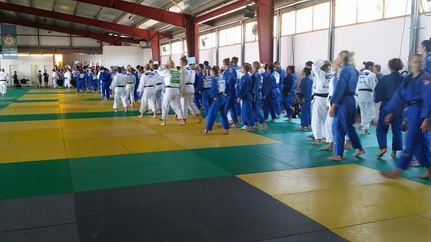 some of the women warming up at camp some of the women warming up at camp In pursuit of greatness it is easy to give up on yourself. To think you are undeserving. To quit when things get hard. To take the easy path. To feel sorry for yourself. To give up when you are faced with discomfort. These past six months I quit my corporate world job and got to live the life of an elite athlete. Here is a recap of the harshest lessons that I learned while pursuing my goals....perhaps my struggles will aid in an easier path for your trek to greatness! The Importance of being TURNED DOWN. Rejection is painful. It makes you feel worthless, unwanted, crappy, unneeded, worthless, valueless. At international training camps you have to go up to other judo players and request for them to go with you. You set "dates" with partners to battle with for each round. If you don't do this, you will have NO partners. You will sit in a room, filled with 6 mats and hundreds of dedicated athletes- alone, cold, and not improving. My first international training camp was in Spain... I would go up to person after person, and of course no one knew me so I got rejection after rejection. I was mentally exhausted. I wanted to just go back to my room and cry. I wanted to sit alone and feel sorry for myself for the constant rejection. Instead, I kept asking. I persisted. "Oh we can't go round 3? How about 4? or 5? what about 6? How about this afternoon? How about tomorrow?" "Hey World Medalist- yeah I am a no one, when are you free?" "Oh new girl, I am a new girl - when are YOU free?" Instead of letting the pain of rejection stop me, it empowered me. I kept at the girls that I wanted and eventually was able to train with all of them. Persistence was key. I was not going to let rejections keep me from my goals and my optimal training. I refused to sit cold and avoided on the side of the mat. I refused to feel sorry for myself. I refused to let others keep me from getting my goals achieved. Others would not stop my work or keep me from my goals. The people in the world that have the best luck are the ones that are turned down a million times. The men who get the most dates, ask out the most women. The people with the best jobs - had been rejected over and over again for similar positions until they landed that role. And the best athletes at camps, were at one time, the new person at camp that got rejected. I left camp braver, more self assured, and with a body covered in bruised proof that I found partners every round. (And encouragingly by my third camp I was entering practices with partners already lined up...and Olympians asking to go with me!) The Importance of RED belt rounds (going after it). In Japan many of the practices I attended consisted of a handful of players being given red belts. They were deemed the fighters for the next 20 minutes. If you were not given a red belt you had to go up to a player with a red belt and request to go with them. Simple. Right? The issue was this - 4 people have red belts. 20 people do not. If you want to get in ANY practice that day, if you want to better yourself, you have to be the FIRST person out there (beating the other 19)- requesting a turn. This was a huge challenge for me. It was unnatural for me. I felt rude pushing in front of others, I was worried I'd run out and the red belt would say no thanks, and I was overwhelmed with introverted paralyzing fear. As I stood on the side of the mat, missing opportunities to train, I realized that I needed to be bold. I needed to put my needs first. I needed to not fear being turned down, pushing someone out of the way, or being seen as too aggressive. If I wanted to have a partner-if I wanted to get better, I had to go out after them. I had to see who I wanted and run for them before anyone else. I had to be ok with being turned down by one red belt and immediately run to the next. Eventually I wasn't happy with settling for a red belt whenever I could get one. I wanted these players during their first round. When they were fresh, not tired, and at their strongest. I would plan out the best place to stand to ensure I got to them first. I would bolt towards them or try to pre-plan with them to ensure I was their partner first. I went from hesitant & nervous, to one of the most aggressive non-red-belts at the training sessions. I refused to let my anxiety and personality characteristics keep me from better myself and getting the most out of my practices. If your goals are out there - and others are lined up for the same thing - get selfish. Get aggressive. Put together an action plan to be the first out there. Be ruthless. Training internationally in red belt rounds and at Olympic Camps taught me the importance of ignoring my timid introversion in order to reach my goals and improve myself. If you have goals you have to GO AFTER THEM. It is scary. It may be uncomfortable. You will have rejections. You will face obstacles. People will avoid you. But to be successful, this is what I learned:
Whether its a mentor, job, or even a date - if there is something you want, go out after it. Be scared. But go for it anyway. Similar to the lessons of Luxembourg, Estonia also dealt with the issue of a small country - therefore it needed solutions to its limited numbers of interested competitors. They also embraced the idea of not being a club snob. There were days where every and any judoka from all of Estonia was invited to open mat, so that the country could improve cohesively. Working together was seen as an advantage to elevating everyone's abilities. At these practices the mats were filled with a slew of sensei's and Olympians, all taking part in aiding people in need. Practices tend to be very focused and focused on a specific thing. A throw was shown. Then live drills were taught that directly correlated with the thrown taught that day. This ensured that students were practicing the throws taught in live situations. Once Randori occurred, these skills were then easily implemented when those scenarios appeared. Start Them Young & Keep it FUN! Estonia had huge kids programs. This was partly attributed to relationships built with area KINDERGARTENs. After having some showcases and play events at the schools, kids wanted to try judo. The kids classes were all game, agility, motion, and play focused. No judo moves were actually taught until the kids were in first grade and the students are only offered two classes a week until they are 13. This pressure-free, fun-focused program ensures that the kids are not burnt out once they are teens. Once they are teens, these kids WANT to work hard. They stay late, lift multiple days a week, and all push each other. I was in awe of this seem-less transition. The 12 and 13 year-olds seem to idolize the older kids and really look forward to being allowed to train more seriously. It was a very different take to what many clubs in the US do, but seemed to work well and kept numbers steady in the teen age range, when numbers seem to plummet in the USA. So what I learned in Estonia- welcome everyone, keep it focused, and keep it fun! Being so small - with a population of a million people and only 600 judoka, the national team had to be crafty with how to become successful internationally. To do so, they open up the national team practices to ALL teen/adult judoka as to maximize the number of bodies at practice and to increase the skill level of the sport overall. This lack of caring about who is from where, but the pure desire to improve & share abilities amongst one another is often lacking amongst places where ego is more important that then sports growth.
Another lovely thing about judo in Lux was the focus on strategy. Knowing that they lack numbers for randori and therefore will never be comparable to powerhouses like Japan & France, instead practices are focused on perfecting strategy, motion, escapes, and positioning. This focus has allowed their top players to become experts in theses areas and has enabled success at the elite (Olympic, Grand Prix) level despite ideal resources. Leaving Luxembourg I truly felt that both the lessons of sharing resources/bodies at open practices, optimizing minimal training time, and focusing on strategy are areas that could not only greatly aid growth and success in Judo in the US. It is beyond difficult to put into words the sadness, gratefulness, love and heart-brokenness that I feel about leaving Japan tomorrow. I can say that this has been time spent that I will always cherish. For me, this time in Japan has been a lifetime coming - and it amazingly lived up to every ounce of anticipation that I had. My parents were judokas who had been trained by Japanese powerhouse Ishakawa, so the country and its culture was something that I was raised to look up to. I can still remember a report that I wrote in sixth grade about the history of judo and its roots in Japan. Even after I quit judo as a pre-teen, the fascination remained and in college I was blessed to room with an exchange student from Japan. When I was reintroduced to judo as an adult, I found a greater attachment & deeper rooted intrigue for the culture that had been ingrained in my life for so long. So why my love for judo??? Whats the big deal? In judo there are some fundamental concepts that I find incredibly ancillary to life: ⦁ The ideal of mutual welfare. Support your partner. Be there for others. Lift them up and they too can lift you. ⦁ Judo means literally the gentle/flexible way. Judo reflects life in that when challenged you often want to fight it, but sometimes being gentle or maintaining a flexible mindset will provide you with the solution. ⦁ Bowing. This signifies respect and thanks to the club, to your partners and sensei's in thanks for them aiding your improvement. ⦁ The idea of Kaizen - or continually improvement, looking for optimization. If taken to heart each of these can carry over into our day to day and can aid immensely in making you a better person. It has been a huge part of my personal ideology and has made me a more supportive, thoughtful, thankful, respectful person who is always trying to improve myself. I love that this sport is able to so beautifully make me a better human being. What I found lovely in Japan was that many of Judo's fundamentals were visible in day to day culture here. People were constantly respectful and thankful to each other. I never left a convenience store without feeling a connection and gratefulness for the workers due to their supportive and genuine nature (something I do not miss about america). The subways, city streets, escalators, construction sites, crosswalks all had a kaizen appeal - being run optimally and efficiently. The culture here was like being in a super friendly, overly productive wonderland. Then there was the fact that Japan, being the birthplace of judo, is still its mecca. To give this some context most dojos that I have been to in the US have 15-40 judo player on the mat on any given night. (Not all clubs...this is an average based on my experiences in various locales....and is not reflective of membership, just normal numbers in attendance.) In japan I never saw less than 70 people at a practice (close to 200 frequently!). This includes at a community center! And keep in mind, there are 100's of clubs here. So the number of judo players is monumental. I was lucky to train at a variety of facilities- as mentioned above community centers, the Kodokan (where judo started, so that had me startstruck), Toei High School, KEIO Univerity, Waseda University, Nittaidai Univesity, and Tsukuba University (Alaa also got to go to the Tokyo Police training when I was broken). What amazed me was the gentleness that the old men used when beating up everyone, the respect held for the seseis and each other, and the speed of everyone's feet. There was welcoming support from every partner at every dojo, making me feel a universal love and connected-ness to the sport and to humanity. The idea that despite not sharing a language we could connect, help one another, and support eachother's goals was truly lovely to me. That being said- judo in japan is insane. I got thrown. Alot. I was out of breathe because the randori never ended. My collarbone injury was excruciating. I struggled. I was pinned and couldn't get out. I got dominated in areas that I had thought were strengths. It was truly challenging. But at the end of the day, I was able to get up after every fall. I found myself succeeding more and more. Despite struggles, the time here really stretched me mentally and physically - causing me to leave Japan feeling more confident, dominant, and inspired to continue to improve than I ever thought possible. So here I am, six weeks in the country that I always dreamed of seeing has somehow flown by. I feel like no amount of time here would be satiating enough. We stayed in the city and countryside and both built big sweetspots in my heart. I think the biggest lesson Japan has taught me, is the importance of breathing in and really FULLY appreciating the NOW. I tried hard to really soak in and appreciate as much as I could while was here. I am not excited for Germany tomorrow, despite the tons of reasons I should be. I am not comparing my lovely experience here with my beautiful time in France. I am just breathing in the fresh air, happy that the typhoon stopped so that I could hear the crickets lull me to sleep.... I am appreciating the moment around me. I tried to do this at each and every practice and it made all of the kindness, connectedness, learnings, and lessons sink in deeply. Thinking ahead and looking back will only deflect from the amazingness that life is offering me in this very moment. And I am so loving it. Tokyo is a magical place. Here are my most memorable thoughts:
Tokyo is one of the most enjoyable cities that I have visited- highly recommend! Because SIGNAGE deserves its own photo gallery.... As I travel I am trying to capture some of my insights in terms of ways that USA Judo could grow the sport based on what I see in other countries...here is my long overdue insights based on my venture to Africa.
While in Morocco I was welcomed to train with the cadet and junior national teams. Each summer the country gathers the top cadets (think top 3-4 per weight class) for a two week training session where they all stay and train together. Here they are paired with the top coaches in the country to provide feedback and strong partners for one another. They do the same thing with the junior team. They also have a few practices where they allow both groups to work together so that the cadets have something to aspire to. Coming out of these camps, the Moroccans headed to the Junior African Championships where the cadets and juniors left with a huge percentage of the medals. As USA judo tries to grow there are not often opportunities for the best up and coming junior athletes to train together and to get insights from international level coaches on what they need to work on to succeed at the next level. Some clubs do a great job of holding fantastic camps which provide these experiences. It would be wonderful in the future to see USA judo investing in the future talent and pay for them to train together for an extended period of time. If I were really to dream, these camps would happen more than 1 time a year and the coaches from the High Performance Committee would then be better in touch with the areas of growth that the up-and-comers need to focus on. This could supply encouragement for these age groups to not quit the sport as they would find pride in this attention and support system. Perhaps at the end of these camps the kids could head to some of the international junior tournaments as a team, so that they begin to see the gap in their games that need focused on if they want to excel as adults. The other huge thing that was prevalent in Morocco were dojos in community centers. You could be in a very poor area, jogging on an unfinished track made of sand instead of tar- but there was a community center building next to it with mats where judo was practiced multiple days a week. Many parks and communities in the US have sport complexes for the neighborhood kids but how many offer mats with karate/bjj/wrestling/judo programs and classes? If we were able to grow awareness of the sport in the poorer areas, give kids the opportunity to practice and stay of the street, this could down the road lead to an increase in membership of the sport. I know this involves hurdles- such as affording mats and finding enough coaches...but imagine if you were able to pull a few coaches of a variety of mat- based sports in the area all willing to commit one night a week to the community center- this may enable to city to invest in a mat area. The mats in Morocco centers are used for other sports as well but the facilities existence growth the awareness and visibility to the sport, which I thought was pretty magical. Frequently when training kids that were playing soccer or basketball would come into the center to see what was going on and ask questions about what judo was. To me that was huge. Just one person's thoughts but figured I would share in case it sparked a bigger idea with others! My husband and I have had three main goals for our judo adventure around the world:
Any athlete knows the agony of having an injury. All you want to do is get back at your sport- the aching is a reminder of what you are unable to do. It plagues your mind. Its similar to when you are a committed employee and you get sick- that presentation, report, and lingering to-do list haunts you as you are stuck in bed to mend. As I was taken to the university doctor for evaluation all I could do was feel sorry for myself. Thinking of the practices I will miss. The opportunities for improvements lost. The worry about how long this will put me out. The self pity machine ran heavy as the doctor twisted, poked, and prodded to determine the source and magnitude of the injury. As an athlete this sense of anger towards being injured is natural - it comes with a deep sense of sadness and helplessness because you are being held back from what you need to do. But I am older for an athlete. I am not stubborn and I refuse to run back to the gym prior to healing. I know injuries and illness are a part of life. And I am not someone who allows for much sulking. Here's my go to "how to survive an injury/illness" guide:
The above being said, I have been working my butt off at self care, committing 100% to it and am feeling better daily and because of this, I will likely be back on the mat earlier than the doctors anticipated! The fact that I only let myself sulk for an hour or so allowed me to spend most of my time committed to being better than ever. Take care of yourself. Listen to your body. Be creative when you are down. Be positive. Then get back at it- stronger, more focused, more gratuitous, and more empowered than ever. 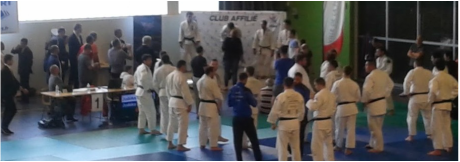 I stood like an anxious parent cheering my heart out at the tournament in France as I watched my training partners compete against the best in the region. As the day passed, I came to a strange realization - all of the teens that I knew best, the ones that were at every session and all the cross training, were the ones leaving with medals. The competitors who I recognized from the club but did not know well, due to their lack of attendance, were the ones quickly defeated and seemingly not surprised. As a competitor that hates to lose, I could not wrap my head around their seeming apathy at the losses- to which my husband calmly replied "they know that they didn't put in the work." It's such a simple concept but one that has taken me years to fully appreciate. When it comes to achieving success in life, you MUST be willing to PUT IN THE WORK. You need to be the one staying late at the office to ensure your assignment is completed on time- and you get that promotion you are after. You need to go to the teachers and TA office hours to fully understand the material- to get that A you want. You need to attend the extra sessions at the gym - to get that place on the medal stand. It is easy to convince yourself that you are giving your all, doing all you can, putting in 110%...but until you fully are committed you will never understand why you are not achieving the success that you think you deserve. So I challenge you- give 110%. How? Mock others who have reached your goals in the past. What efforts did they put in? What have you not been doing? Who can you mimic? Get role models. Ask for help. Try things differently. Do research. Be honest with your boss/coach about your goals and make a plan to get there. Surround yourself with partners, classmates and co-workers who lift you up and help you work towards those goals. Do not be afraid to fail. It will be hard. But if you are wanting more it will be worth it. If you are attending things in life and are satisfied with not achieving highest levels of success, that is totally OK. But if you are wanting more - do more. You can. |
KristinBeliever that everyone is special. Categories
All
Archives
September 2017
|
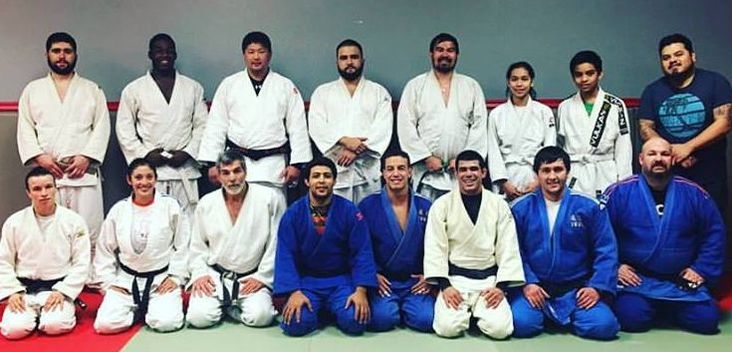
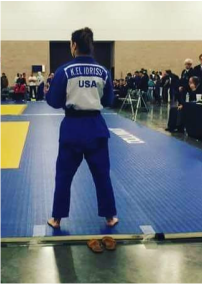
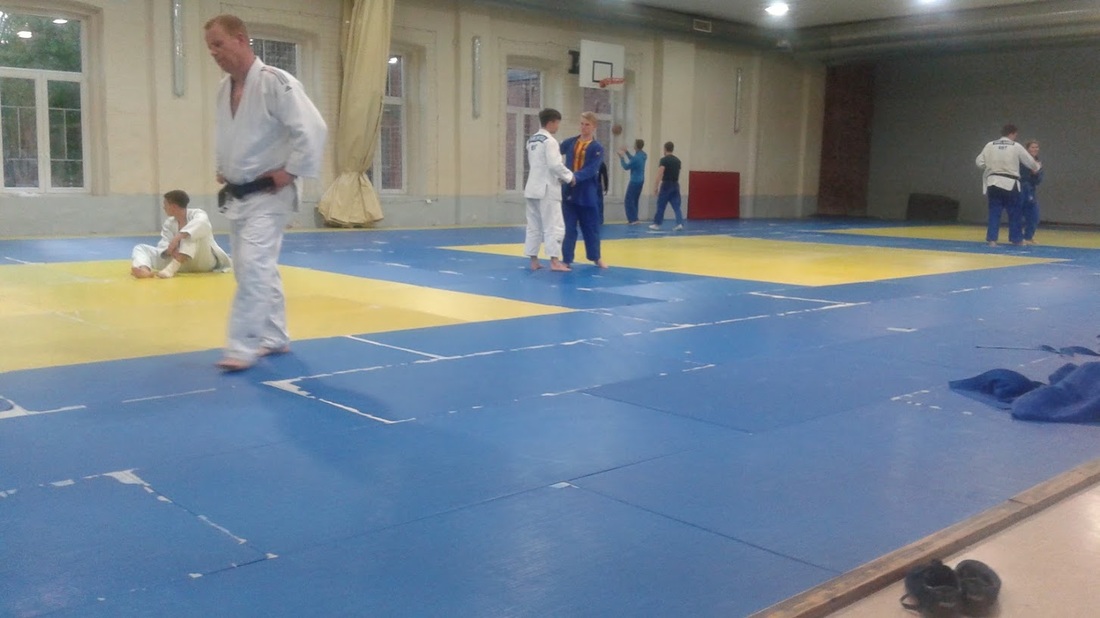

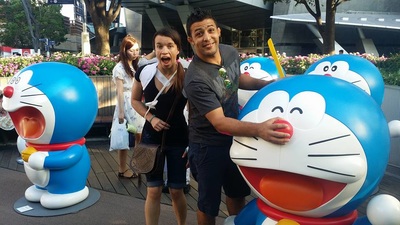
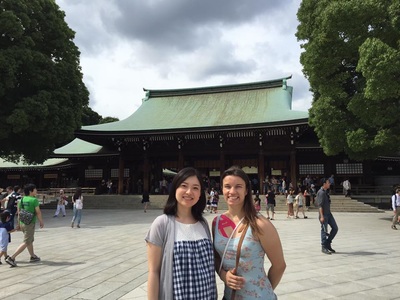
 RSS Feed
RSS Feed
